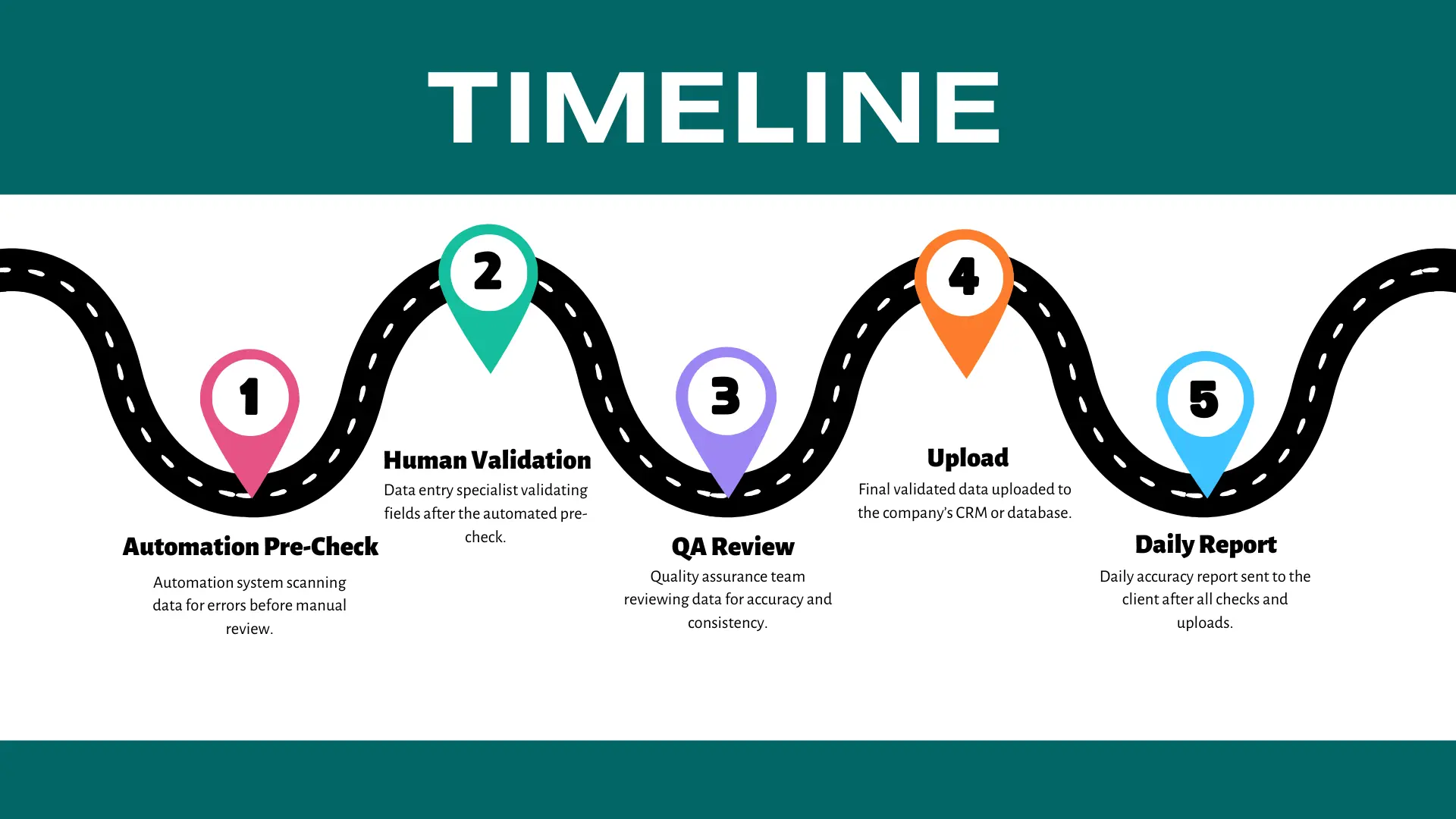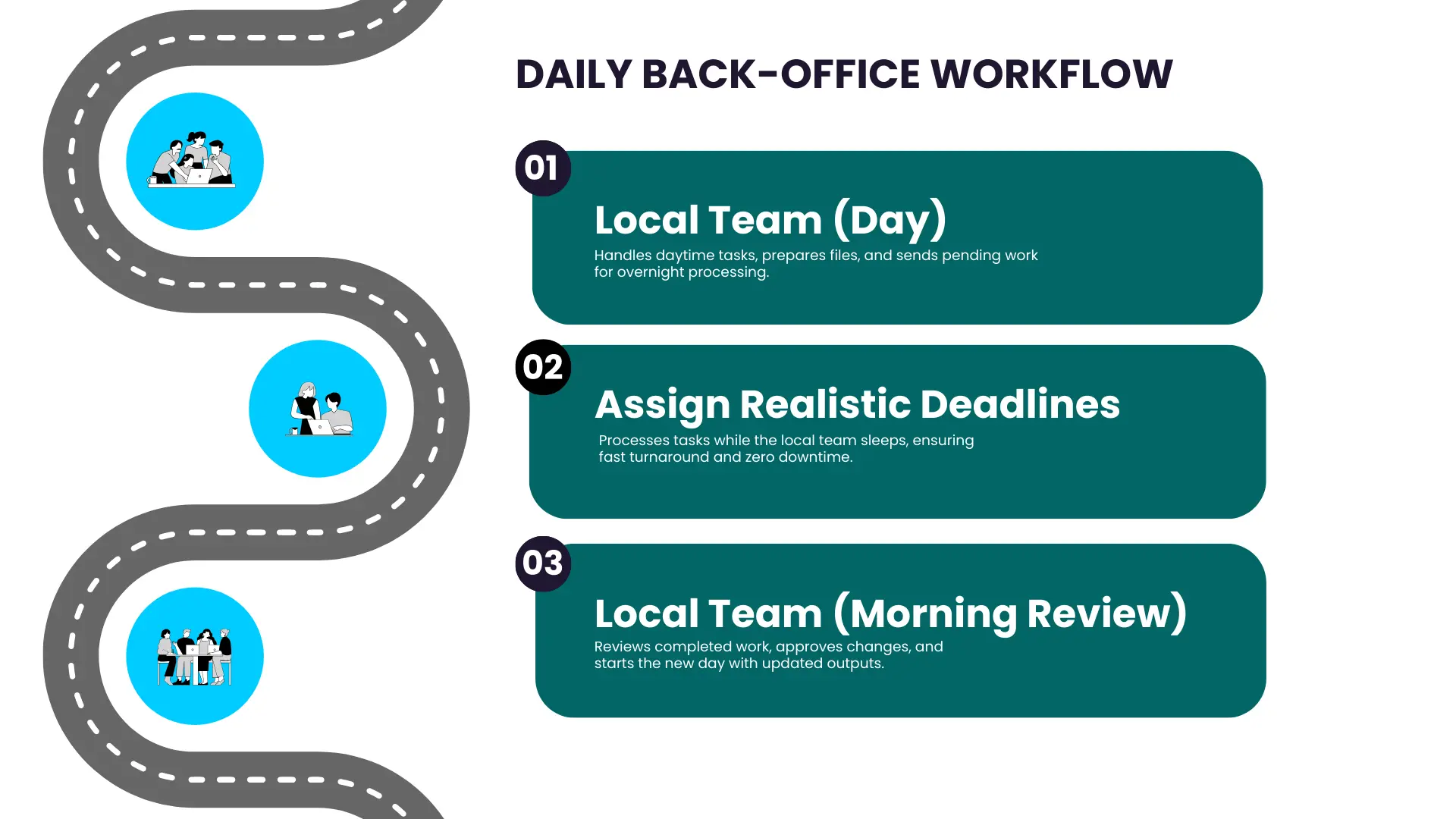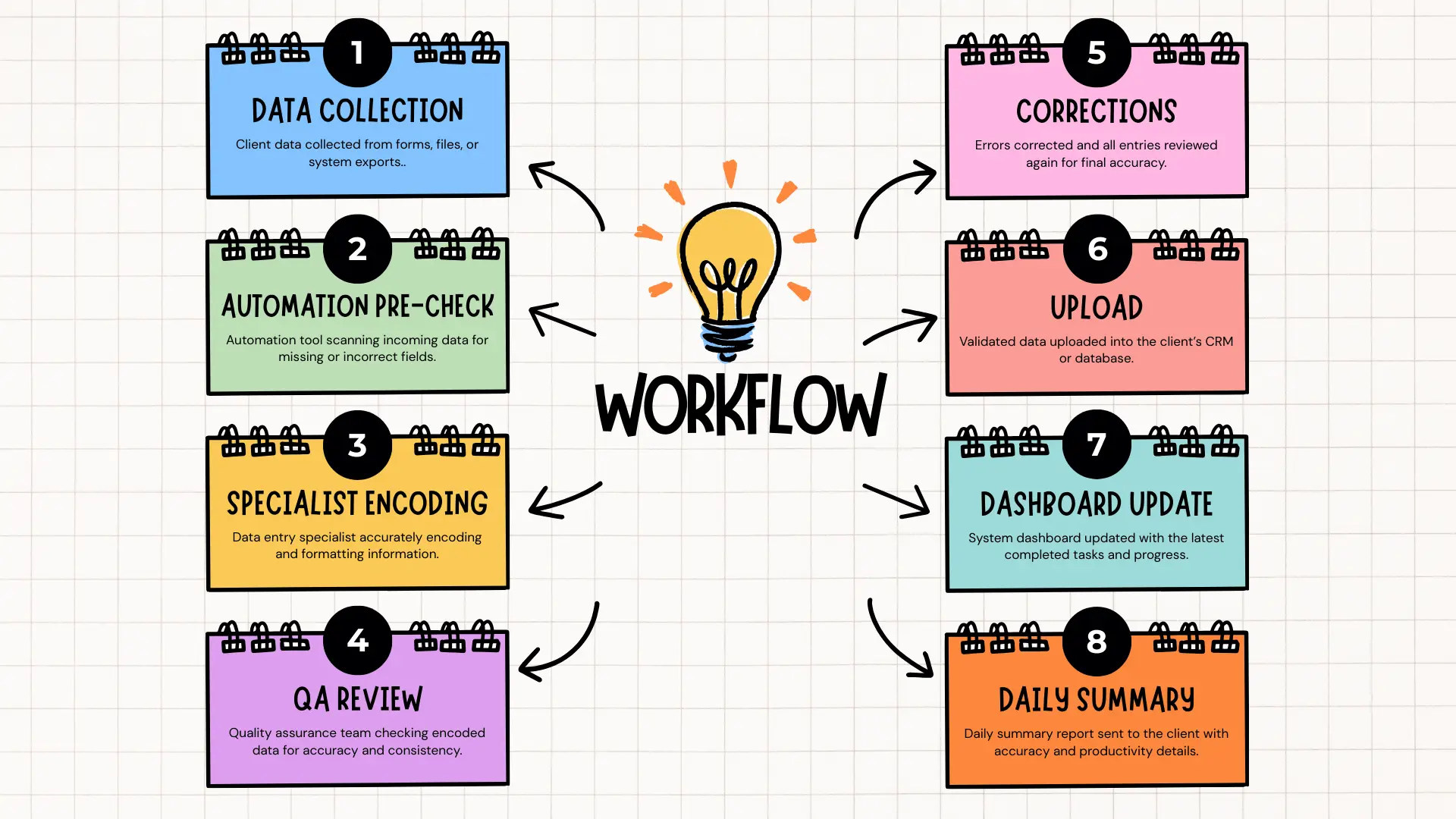Back-office outsourcing continues to evolve. Tasks like data entry, billing, payroll, reporting, compliance, and admin support used to follow simple, repetitive processes. Today, these tasks are handled with smarter tools, skilled specialists, and global workflows that run around the clock.
This guide explains the biggest trends shaping back-office outsourcing in 2026—and how these trends will shape the future of operations in the next 3–5 years. You’ll see real examples, simple workflows, updated cost ranges, and future predictions that help you plan ahead.
If you want a deeper overview of how outsourcing works across different industries, explore our complete guide to back-office outsourcing services.
Hybrid Teams Will Become the Standard (Humans + Automation)
Automation is not replacing workers—it’s supporting them.
AI handles repetitive tasks; humans verify accuracy and manage decision-making.
Examples
- Clinics use automation to extract PHI and claims data; human specialists validate fields.
- eCommerce stores auto-tag returns while outsourced agents verify photos and approve refunds.
Stats
- 40–60% faster processing
- 30–50% fewer errors
Workflow

Many companies adopt these workflows for tasks covered in our guide on outsourcing data entry for accuracy and speed, where human validation and QA reduce errors.
Future Outlook (2027–2030)
More businesses will adopt “automation-first” workflows where 70–80% of raw data is pre-processed before reaching a human.
Industry-Specific Back Office Roles Will Grow Faster Than General Admin
Back-office outsourcing is shifting from “general support” to industry-focused teams.
Examples
- Healthcare: claims, billing, insurance checks, prior authorizations
- Finance: reconciliation, expense audits, payment validation
- Logistics: shipment reports, POD logging, driver records
- eCommerce: SKU updates, order documentation, customer record cleanup
Healthcare teams benefit the most from structured workflows, and we break this down further in our healthcare process outsourcing guide.
Stats
- 33% growth in industry-specific outsourcing from 2024–2026
- Healthcare and finance expected to double by 2028
Future Outlook
By 2030, most outsourced back-office roles will require niche skills, not generic admin work.
24/7 Support Through Philippine-Based Teams Will Become a Global Standard
Businesses want continuous operations—especially service-based companies, clinics, and online stores.
Examples
- U.S. firms use PH night-shift teams to process next-day orders.
- Australian clinics send billing logs to PH teams for overnight cleanup.
Stats
- 78% of companies benefit from round-the-clock workflows
- Backlogs drop by 60–70% with mirrored shifts
Workflow

Cloud Tools Will Become Universal Across All Outsourced Back Offices
Shared dashboards, cloud CRMs, and real-time tracking are now the norm.
Examples
- Finance teams use QuickBooks + shared folders for daily reconciliation.
- Remote real-estate teams use cloud CRMs to update property records.
- eCommerce teams work inside Shopify, Google Sheets, and Gorgias.
Stats
- 89% of outsourcing setups rely on cloud platforms
- Cloud tools reduce reporting delays by 60%
Future Outlook
Expect a shift to “single-dashboard visibility” where clients see real-time output across all outsourced functions.
Accuracy and Compliance Will Matter More Than Cost Savings
Companies are outsourcing to reduce mistakes, not just expenses.
Examples
- Finance teams outsource reconciliation because a single wrong value changes entire reports.
- Healthcare providers outsource billing QA to avoid rejected claims.
QA Steps in Modern Back-Office Teams
- Standard formatting rules
- Dual-entry verification
- Random audits
- Daily accuracy reports
Stats
- 98–99.9% accuracy maintained by QA-supported teams
Future Outlook
By 2030, accuracy and compliance may become the primary reason businesses outsource.
This matters most for clinics and hospitals handling patient data, where our HIPAA-compliant outsourcing practices explain how PHI stays protected.
Small “1–2 Seat” Back Office Setups Will Grow Rapidly
Small businesses don’t need large teams—just dependable daily support.
Examples
- A 1-seat encoder managing daily orders
- A 2-seat setup for bookkeeping + admin support
- Startups offloading repetitive tasks to scale faster
Stats
- 52% of outsourcing inquiries come from small businesses
- Micro teams save 20–40 hours per week
Future Outlook
Micro-outsourcing will dominate the small business market as inflation raises hiring costs.
Transparent Monthly Pricing Will Become the Industry Norm
Businesses prefer fixed, predictable costs.
PH Cost Range (2026–2027)
- Data Entry: $600–$900/month
- Finance Support: $900–$1,500/month
- Healthcare RCM: $1,200–$2,000/month
- Admin Assistants: $700–$1,100/month
To understand how pricing affects long-term planning, you can review our outsourcing cost savings breakdown, which shows real examples and ranges.
Future Outlook
Expect bundled plans (software + specialist + QA) by 2028.
Old vs New Back Office Methods (2026 and Beyond)
| Old Method | New Method (2026+) |
| Manual processes | Automation-supported workflows |
| One general assistant | Industry-specific specialists |
| Local-only teams | 24/7 global support |
| Emails and spreadsheets | Cloud dashboards + shared tools |
| Seasonal temps | Scalable micro-outsourced teams |
| Unpredictable costs | Fixed monthly rates |
Future Predictions for 2027–2030
Prediction 1: 80% of Back-Office Work Will Use AI Pre-Processing
AI will prepare most data; humans will focus on accuracy, judgment, and cases requiring context.
Prediction 2: Compliance Will Drive Hiring
Healthcare, finance, and legal outsourcing will require more training and certifications.
Prediction 3: Outsourced Teams Will Handle More Operational Work
Expect outsourced teams to manage reporting, analysis prep, and quality checks—not just raw data tasks.
Prediction 4: One-Click Outsourcing Platforms Will Rise
Businesses will hire talent directly through integrated platforms that combine tools + people + workflow management.
Workflow Example for 2026 and Beyond

How Back Office Outsourcing Is Evolving
Back-office outsourcing is shifting from simple admin tasks to smarter, faster, and more accurate support systems. Automation, global teams, cloud tools, and industry specialization are shaping how businesses will operate in 2026 and the coming decade. Whether you’re a startup or an established company, outsourcing gives you flexibility, accuracy, and steady support that grows with your needs.
If you want to upgrade your back-office operations, start small. One or two trained specialists supported by automation and QA can make your daily workflows faster and more reliable.













